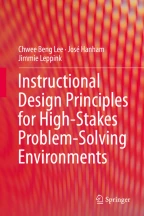Conducting Task Analysis

In instructional design, task analysis is one of the most critical components in which learning goals, objectives, types of tasks and requirements to perform the specific tasks are identified. In this chapter, we provide an overview of task analysis and discuss the most relevant task analysis methods with concrete examples. As we focus on high-stakes learning environments and argue for the centrality of problem solving, we specifically discuss case-based reasoning and critical incident/critical decision methods that are highly relevant to problem solving.
This is a preview of subscription content, log in via an institution to check access.
Access this chapter
Subscribe and save
Springer+ Basic
€32.70 /Month
- Get 10 units per month
- Download Article/Chapter or eBook
- 1 Unit = 1 Article or 1 Chapter
- Cancel anytime
Buy Now
Price includes VAT (France)
eBook EUR 42.79 Price includes VAT (France)
Hardcover Book EUR 52.74 Price includes VAT (France)
Tax calculation will be finalised at checkout
Purchases are for personal use only
Similar content being viewed by others

The Power of Learning-Centered Task Design: An Exercise in the Application of the Variation Principle
Chapter © 2014

The Relationships Between Task Design, Anticipated Pedagogies, and Student Learning
Chapter © 2015

The Critical Role of Task Design in Lesson Study
Chapter © 2015
References
- Aamodt, A., & Plaza, E. (1994). Case-based reasoning: Foundational issues, methodological variations, and system approaches. Artificial Intelligence Communications, 7, 39–59. Google Scholar
- Berkow, S., Virkstis, K., Stewart, J., & Conway, L. (2009). Assessing new graduate nurse performance. Nurse Educator, 34, 17–22. https://doi.org/10.1097/01.NNE.0000343405.90362.15ArticleGoogle Scholar
- Birks, M., James, A., Chung, C., Cant, R., & Davis, J. (2014). The teaching of physical assessment skills in pre-registration nursing programmes in Australia: Issues for nursing education. Collegian, 21, 245–253. https://doi.org/10.1016/j.colegn.2013.05.001ArticleGoogle Scholar
- Brown, A., & Green, T. (2016). The essential of instructional design: Connecting fundamental principles with process and practice. New York: Routledge. https://doi.org/10.1097/1001.NNE.0000343405.0000390362.0000343415BookGoogle Scholar
- Burns, P., & Poster, E. (2008). Competency development in new registered nurse graduates: Closing the gap between education and practice. Journal of Continuing Education in Nursing, 39, 67–73. https://doi.org/10.3928/00220124-20080201-03ArticleGoogle Scholar
- Crandall, B., Klein, G., & Hoffman, R. R. (2006). Working minds: A practitioner’s guide to cognitive task analysis. Cambridge, MA: MIT Press. BookGoogle Scholar
- Hoffmann, R., & Militello, L. (2008). Perspectives on cognitive task analysis: Historical origins and modern communication of practice. New York: Taylor & Francis. BookGoogle Scholar
- Jonassen, D., Strobel, Y., & Lee, C. B. (2006). Everyday problem solving in engineering: Lessons for educators. Journal of Engineering Education, 95, 139–152. https://doi.org/10.1002/j.2168-9830.2006.tb00885.xArticleGoogle Scholar
- Jonassen, D. H., Tessmer, M., & Hannum, W. H. (1999). Task analysis methods for instructional design. Mahwah, NJ: Erlbaum. Google Scholar
- Kolodner, J. (1993). Case-based reasoning. San Mateo, CA: Morgan-Kaufman. BookGoogle Scholar
- Lee, C. B., Qi, J., & Rooney P. (2015). Capturing and assessing the experience of experiential learning: Understanding teaching and learning in a behaviourally challenging context. Western Sydney University. ISBN:978–1–74108-430-6. Google Scholar
- Morrison, G. R., Ross, S. M., & Kemp, J. E. (2004). Designing effective instruction (4th ed.). New York: Wiley. Google Scholar
- Riggle, J., Wadman, M., McCrory, B., Lowndes, B., Heald, E., Cartsens, P., et al. (2014). Task analysis method for procedural training curriculum development. Perspectives on Medical Education, 3, 204–218. https://doi.org/10.1007/s40037-013-0100-1ArticleGoogle Scholar
- Smith, P. L., & Ragan, T. J. (2005). Instructional design (3rd ed.). New York: Wiley. Google Scholar
Author information
Authors and Affiliations
- Western Sydney University, Penrith, NSW, Australia Chwee Beng Lee
- Chwee Beng Lee

